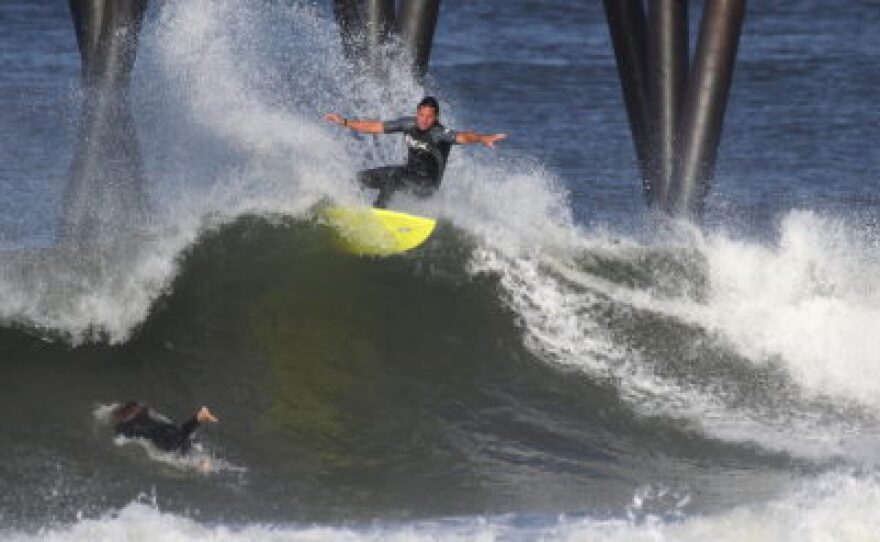Surfing is now California’s state sport and nowhere was that news more joyfully received than at the California Surf Museum in Oceanside. In fact, you could say they were "stoked."
Governor Jerry Brown signed a bill last week designating surfing as California’s official sport. There are many places that could claim surfing as their own, including Hawaii and other major surf spots worldwide. But much of the history of riding the waves has taken place right here in the golden state and it’s celebrated at the surf museum.
Jane Schmause, historian at the California Surf Museum, talks about the history of surfing in California Tuesday on Midday Edition.
Surfing is now California's state sport and nowhere was that news more joyfully received than at the California surf museum in Oceanside. In fact you could say they were stoked. Governor Jerry Brown signed the bill last week designating surfing as California's official sport. There are many places that could claim surfing as their own. Hawaii and other major surf spots worldwide but much of the history of riding the waves has taken place right here and it's celebrated at the surf museum. Joining me from the California surf museum via Skype is Jane schmoes Museum historian. And Jane welcome. Thank you. It's nice to hear from you. Now did you see this designation as surfing the California states board. Did you see that designation coming is it something you lobbied for. No we totally came from left field and it was a it was a wonderful recognition of how valuable the sport is to the state of California. How much it's grown in a little over 100 years and and. How many people really participate either in the water or supporting you know the surf industry as it is now naming surfing the official state sport is largely symbolic but do you see any practical benefits coming out of it. I think there are several practical benefits. When we started the surf museum 32 years ago we didn't get much positive feedback from anybody business organizations or people that might have helped to set things in place 32 years ago. Now I have to say it's very exciting to have this validation that surfing is as important to our culture here in especially southern California. But believe me it goes all the way out to state all the way up the coast and down the coast. So it's it's a wonderful wonderful recognition of the place that surfing has on the hearts of so many people in our state. What are some of the reasons that you think California can claim surfing as its own state sport. Well I think because surfing is an unusual sport in that it it percolates into the culture in ways that you recognize or maybe you live with every day you like surf music you've gone to surf movies you wear surf style clothing you do a little surfer speak like wow that's awesome or oh god I just had a Norley yesterday. These and then of course that trickled down into skateboarding and snowboarding and other types of related sports. But it all had its roots with surfing. There's not too many other sports that can claim that sort of widespread appreciation. You bring me to a point Jane. There were some critical responses to surfing being named the state's sport. Those critics said skateboarding should really be California's state sport. What's your response to that. I think it's I think that's awesome. I mean like I said this particular recognition caught us out of left field. We didn't know what was happening. We celebrate that it has happened. Skateboarding is a fabulous spinoff sport of surfing but surfing is where it comes from is that your point. I think that's my point. I think that's my point. Also I wanted to make the point that as our population continues to grow and there are more and more people discovering surfing we're losing some of our or we're closing in on possibly losing and we need to protect some of our very important surf spots. We had that that little kerfuffle over Tressel's a few years ago. And surfers have to be aware that they have to protect the places that are very important to them. And I think this bit of recognition by the state may give a little weight to anything that surfers may have to stand up for. Now how do people respond to this search history and the memorabilia you have on display at the California surf museum. It blows us away. Here at the museum for 32 years we've been presenting the history of surfing here through the California surf museum. And 75 percent of our guests just come to Southern California and they see that there's a surf museum. They come in and hopefully they leave with a little sense of the passion and the stoke that we have felt from all the surfers that we've studied and been involved with throughout the years. It's not that we know what's happening. We've learned it from our heroes from the guys who led the way led the charge the true pioneers. We want to stay with that stock we want to keep that passion. We want to impart that to our visitors. I've been speaking with Jane Shmause historian at the California surf museum in Oceanside and Jane thank you. Thank you.







